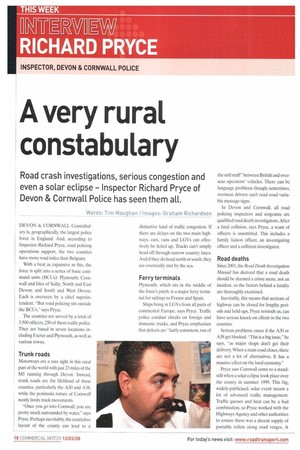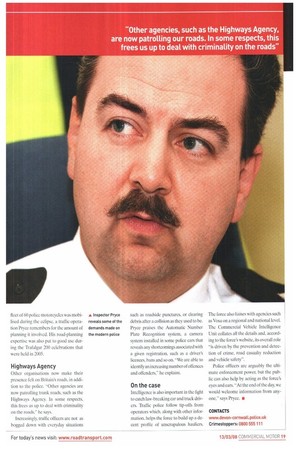A very rural constabulary
Page 18

Page 19

If you've noticed an error in this article please click here to report it so we can fix it.
Road crash investigations, serious congestion and even a solar eclipse Inspector Richard Pryce of Devon & Cornwall Police has seen them all.
Words: Tim Maughan i images: Uraham Richardson DEVON & CORNWALL Constabulary is, geographically, the largest police force in England. And, according to Inspector Richard Pryce, road policing operations support, the two counties have more road miles than Belgium.
With a beat as expansive as this, the force is split into a series of basic command units (BCUs): Plymouth; Cornwall and Isles of Scilly; North and East Devon; and South and West Devon. Each is overseen by a chief superintendent. "But road policing sits outside the BCUs," says Pryce.
The counties are served by a total of 3,500 officers, 250 of them traffic police. They are based in seven locations including Exeter and Plymouth, as well as various towns.
Trunk roads Motorways are a rare sight in this rural part of the world with just 23 miles of the M5 running through Devon. Instead, trunk roads are the lifeblood of these counties, particularly the A30 and A38, while the peninsula nature of Cornwall neatly limits truck movements.
"Once you go into Cornwall, you are pretty much surrounded by water," says Pryce. Perhaps inevitably, the restrictive layout of the county can lead to a distinctive kind of traffic congestion. If there are delays on the two main highways, cars, vans and LGVs can effectively be holed up. Trucks can't simply head off through narrow country lanes. And if they do head north or south, they are eventually met by the sea.
Ferry terminals Plymouth, which sits in the middle of the force's patch, is a major ferry terminal for sailings to France and Spain.
Ships bring in LGVs from all parts of continental Europe, says Pryce. Traffic police conduct checks on foreign and domestic trucks, and Pryce emphasises that defects are "fairly consistent, run of the mill stuff" between British and overseas operators' vehicles. There can be language problems though; sometimes, overseas drivers can't read road variable message signs.
In Devon and Cornwall, all road policing inspectors and sergeants are qualified road death investigators. After a fatal collision, says Pryce, a team of officers is assembled. This includes a family liaison officer, an investigating officer and a collision investigator.
Road deaths Since 2001, the Road Death Investigation Manual has decreed that a road death should be deemed a crime scene, not an incident, so the factors behind a fatality are thoroughly examined.
Inevitably, this means that sections of highway can be closed for lengthy periods and hold-ups, Pryce reminds us, can have serious knock-on effects in the two counties.
Serious problems ensue if the A30 or A38 get blocked. "This is a big issue," he says, "as major shops don't get their delivery. When a main road closes, there arc not a lot of alternatives. It has a massive effect on the local economy."
Pryce saw Cornwall come to a standstill when a solar eclipse took place over the county in summer 1999. This big, widely-publicised, solar event meant a lot of advanced traffic management. Traffic queues and heat can be a bad combination, so Pryce worked with the Highways Agency and other authorities to ensure there was a decent supply of portable toilets along road verges. A fleet of 60 police motorcycles was mobilised during the eclipse, a traffic operation Pryce remembers for the amount of planning it involved. His road-planning expertise was also put to good use during the Trafalgar 200 celebrations that were held in 2005.
Highways Agency Other organisations now make their presence felt on Britain's roads, in addition to the police. -Other agencies are now patrolling trunk roads, such as the Highways Agency. In some respects, this frees us up to deal with criminality on the roads," he says.
Increasingly, traffic officers are not as bogged down with everyday situations such as roadside punctures, or clearing debris after a collision as they used to be. Pryce praises the Automatic Number Plate Recognition system, a camera system installed in some police cars that reveals any shortcomings associated with a given registration. such as a driver's licences, bans and so on. "We are able to identify an increasing number of offences and offenders," he explains.
On the case
Intelligence is also important in the fight to catch law-breaking car and truck drivers. Traffic police follow tip-offs from operators which, along with other information, helps the force to build up a decent profile of unscrupulous hauliers. The force also liaises with agencies such as Vosa on a regional and national level. The Commercial Vehicle Intelligence Unit collates all the details and, according to the force's website, its overall role "is driven by the prevention and detection of crime, road casualty reduction and vehicle safety".
Police officers are arguably the ultimate enforcement power, but the public can also help by acting as the force's eyes and ears. -At the end of the day, we would welcome information from anyone," says Pryce. •
CONTACTS
www.devon-cornwall.police.uk Crimestoppers: 0800 555 111








































































































































































